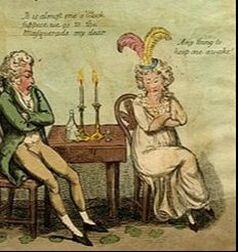| “Here I am once more in this scene of dissipation and vice, and I begin already to find my morals corrupted." -- Jane Austen in a letter from London, August 1796 |
 Fashionably late Londoners: "It is almost one o'clock, suppose we go to the Masquerade?"
Fashionably late Londoners: "It is almost one o'clock, suppose we go to the Masquerade?" One proviso: we can’t be certain that Caroline Burney was a woman. The name is probably a pseudonym, an attempt to cash in on the fame of Frances Burney and her half-sister Sarah Harriet Burney. When Sarah Harriet’s publisher brought out Traits of Nature, he advertised: “'The publisher of this Work thinks it proper to state that Miss Burney is not the Author of a Novel called "Seraphina," published in the year 1809, under the assumed name of Caroline Burney.” Well, Caroline Burney identified as a female, so that should be good enough for our purposes.
In addition, the subtitle A Winter in Town is an echo of the best-selling A Winter in London by Thomas William Surr, which I reviewed here. According to scholar Chris Stevens, Surr’s novel created such a sensation that it briefly inspired its own “microgenre,” the “Season” novel, meaning of course the social season in London, Bath, Brighton, or wherever. These “Season” novels featured wealthy and titled characters behaving badly. Sometimes these portraits were obviously based upon real people, which added to the appeal of the books. London as a sinkhole of vice was such a popular theme in novels that Jane Austen jokes about it in a letter to her sister Cassandra, quoted above.
Some of the older novels I’ve been reading were reviewed in their day, but many came out to no fanfare, and Caroline Burney’s three-volume effort is one of those. So, out of fellow-feeling for these neglected authoresses, I’m instituting an occasional series of book reviews for novels that never got a book review. This post, (I think), is the very first review of Seraphina, or A Winter in Town...
 Beautiful blushes: Mrs Russell (nee Cox) by John Smart, 1781
Beautiful blushes: Mrs Russell (nee Cox) by John Smart, 1781 We first meet Seraphina, a beautiful, high-spirited girl, as she carries a basket of clothes to the poor of her quiet Welsh village. She is not a sensitive, weeping, fainting, fluttering, “picture of perfection” heroine but I suppose that's because her situation is not dire. She is a foundling but she has an inheritance. She loves her foster-parents and she’s not particularly curious about how she came to be in their care one mysterious night in London when she was a baby.
Her foster-father Dr. Melbourne resolves to bring her to London to establish her true identity although he's very anxious about exposing his lovely, innocent ward to the depravity of town. His wife assures him: “Seraphina is not of the common cast; her mind is too well stored with elegant resources, and her heart too strictly guarded by delicacy, to yield to the puerile temptations of fashion and folly.”
Seraphina's neighbour Edward Pembroke has been like an older brother to Seraphina. He helped educate her, just as Edmund Bertram educated Fanny Price, and he occasionally rebukes her like Mr. Knightley admonishes Emma. “In all these little contests the mild steadiness of Edward’s temper triumphed over the vivacity of Seraphina’s, and although she would not always acknowledge that she thought him right, her prompt correction of the fault he had censured, evinced the respect she felt for his opinion, and never failed of obtaining for her the approbation she secretly wished for.”
Edward is also very worried about the snares of London. What if Seraphina is caught up in the vortex of dissipation like his sister Sophia? “Oh Seraphina! Happy thoughtless being, how little do you dream of the anxiety that throbs within this bosom upon your account! However, I will warn her of the precipice she stands upon; and if for one moment she can be serious, perhaps the impression may be indelible.”
While Seraphina is quite intelligent in most respects she doesn't realize that Edward is madly in love with her. In fact, she protests, “Edward… is the last person in the world that would think of me in that light; why, he does nothing but find fault with me from morning till night. My lessons were never perfect enough for him…” We must excuse her, however, and blame her obtuseness on the conventions of the romantic novel.

Her hostess Lady Avondale is addicted to gaming, and takes advantage of Seraphina's naivete by borrowing every guinea she has. Dr. Melbourne takes Lord Avondale to task for not keeping his wife under control. “My dear Dr. Melbourne,” answered Lord Avondale, “what can I do? I should be lampooned and ridiculed in every society, were I to pretend to prescribe rules for the conduct of my wife whilst she keeps within the bounds of decorum.”
 The Dandy's Toilette
The Dandy's Toilette There are a number of secondary characters who are not deployed to maximum advantage. They are briefly introduced as recognizable stock characters (the fop! the sprightly sidekick!) but they are given little or nothing to do.
There’s also Edward and Lady Avondale's sister Fanny, a sweet-tempered auxiliary heroine languishing back in Wales. Their sailor brother Robert drops by as well but it’s hard to see why, unless as an excuse to touch upon current events, ie, the war against “Bony.” “There was something so droll and good-humoured in the honest sailor… although Lady Avondale could not help wishing he was a little more refined, yet as he was much talked of for his late exploits at sea, she felt gratified in being pointed out as the sister of the celebrated naval hero.”
Sir Effingham Wilson, another minor character, is an older man who makes himself ridiculous by dressing like a young buck. Seraphina can’t help laughing at him because “as he disclaimed the reverence due to old age by his foppery, my usual inclination to laugh at whatever is ridiculous, will certainly prevail.”
As is often the case with novels of this era, (but seldom with Austen) servants serve as devices for exposition. Old Peter laments how London has turned Sophia Pembroke into the decadent Lady Avondale: “I should never have guess it was our Miss Sophia as was, for lack-a-daisy! how she was painted, if she had blushed ever so, you could not have seed it…” Servants are also essential for furthering or thwarting the evil intentions of their employers. Lady Avondale instructs her lady's maid to get her hands on Seraphina’s jewels so she can exchange them for fakes. Another knock against Lady Avondale’s character, which contemporary audiences would have understood, is that she gossips with and confides in her maid. Seraphina, by contrast, refuses to let her maid gossip about Lady Avondale.
There are a few characters who are more fully drawn. Seraphina’s foster-father Dr. Melbourne is eccentric and humorous at home, but switches to being a severe moralizer in London. A typical reflection: “How much more painful is it to tread the crooked mazes of vice and folly, beneath the roses that adorn that deceitful labyrinth, lurk the serpent’s remorse, repentance, and unpitied anguish, ready to punish with their stings the errors of the thoughtless crew that tread their forbidden haunts.”
There is also a love-rival for Edward in the form of Lord Claredown, a Henry Crawford type. “Numberless innocent unsuspecting hearts had been beguiled of all their happiness long ere they were aware of the danger that awaited them. Several victims had sunk into premature graves, and others had sought revenge for his perfidy [by marrying] the objects of their aversion.” This reminds us of how Maria Bertram married Mr. Rushworth rather than admit that Crawford had scorched her heart.
Seraphina is drawn to the sexy and magnetic Claredown until she realizes he’s the man who broke her friend Fanny’s heart, “and he who could trifle with her happiness, shall never endanger mine.”
Lord Claredown is not the only man who is attracted to Seraphina, even before her true identity is known. When Sir Effingham proposes marriage, she is so astonished that she “was unable to answer for some minutes.” When he tries to “construe her silence into an assent to his proposals,” Seraphina “could no longer command herself, but burst into a fit of laughter.”
| Seraphina is oblivious to the growing evidence that she is the long-lost daughter of Lady Cremona, who died under mysterious circumstances. Almost everywhere she goes in London, someone sees her and gasps in surprise, because she is the perfect image of her late mother. I was reminded of the comic sequence in Kung Fu Panda 3 when Po meets his father. Although Seraphina’s not so good at putting two and two together where her own interests are concerned, she is resolute and courageous when she is abducted by some treacherous Italians (are there any other kind?) who want to replace her, the true heiress, with an imposter. | |
Edward and Seraphina are married, and other minor characters are also matched in matrimony in a swift summing-up.
I’d say three and a half stars out of five for Seraphina. I'm not judging it against great literature but how it stacks up against other novels of the same genre. While the author misses out on some possibilities, and the coincidences are so frequent and improbable as to be comical, the heroine isn’t insipid and the action moves briskly. An 18th-century book reviewer would add that virtue is rewarded and the dissipated characters repent and reform.
Although Seraphina didn't get a book review, we know that it was available at 9 of 22 circulating libraries throughout the kingdom, according to the British Fiction database,
Novels like A Winter in London may be obscure, but every novel I read teaches me more about the tropes and literary conventions of Austen's time and how she related to them. It also teaches me about how Regency England saw itself, and how novels prescribed ideal conduct for men and women. No doubt reality was far different from novels (this was something that Austen laughed about) but it's interesting to explore the expectations that abounded in the literature of the day. In future, I'll be talking about a different kind of heroine than the lively Seraphina: the "bear and forbear" heroine.
Previous post: "The right of a lively mind" Next post: Chains of love...
| I’m always amused when I think of the argument that Pride & Prejudice was a revolutionary novel because of its critical portrayal of the aristocratic Lady Catherine de Bourgh. Novelists of the long 18th century made their bread and butter by criticizing the aristocrats. Here's an earlier post I wrote about blushing girls and how it is still a thing in China, where I lived for four years. Lorna Clark quotes Anne Hawkins in "The Literary Legacy of Sarah Harriet Burney." Eighteenth-Century Life 1 April 2018; 42 (2). Rachel Howard, Domesticating the Novel : Moral-Domestic Fiction, 1820-1834. 2007. Chris Stevens, "The Season Novel, 1806-1824: A Nineteenth-Century Microgenre." Victoriographies, (2017), 7(2), 81–100. |

 RSS Feed
RSS Feed